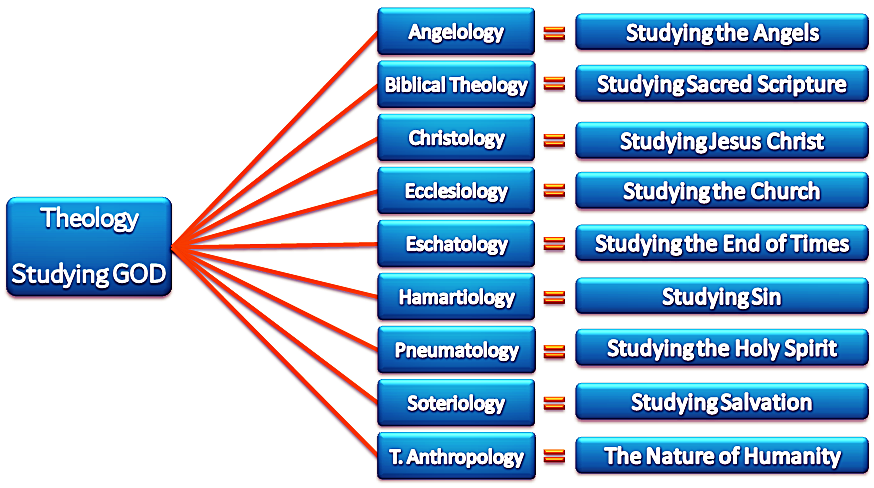Exploring the Branches of Theology: A Journey Through Sacred Disciplines
Theology, in its broadest sense, is the study of God, creation, and the divine-human relationship. Yet within this vast domain, distinct branches emerge—each offering a particular lens through which the mystery of faith is explored and articulated. These theological disciplines have developed over centuries through dialogue, reflection, scripture, and lived experience. What follows is a guided introduction to nine key branches, each bearing its own insights, questions, and contributions to the Church’s understanding of divine truth.
1. Angelology – The Study of Angels
Angelology is the theological study of angels: their nature, purpose, and activity within creation. Rooted in both Sacred Scripture and Sacred Tradition, this discipline examines:
The hierarchy of angelic beings (e.g., Seraphim, Cherubim, Thrones)
The role of angels as messengers and servants of God
The theology of guardian angels and angelic intercession
Fallen angels and the doctrine of Satan and demons
Angelology finds scriptural grounding in texts like Daniel, Revelation, and the Synoptic Gospels, and is richly interpreted by Church Fathers such as Dionysius the Areopagite and St. Thomas Aquinas. Far from esoteric, the theology of angels underscores the reality of spiritual warfare, divine protection, and the unseen dimensions of grace.
2. Biblical Theology – Scripture’s Divine Narrative
Biblical Theology focuses on understanding the Bible’s overarching themes and theological messages within their historical and canonical contexts. Unlike systematic theology, which organizes doctrine topically, biblical theology aims to trace:
The unfolding revelation of God across salvation history
Covenantal structures between God and humanity
Themes such as creation, fall, redemption, and new creation
How Christ fulfills Old Testament promises and prophecies
It draws from exegesis, hermeneutics, and historical analysis, bridging both Testaments into a coherent theological portrait. Biblical Theology is foundational to all Christian understanding—it roots faith in God’s self-revelation and anchors doctrine in divine narrative.
3. Christology – The Study of Christ
Christology explores the identity, nature, and mission of Jesus Christ—the Word made flesh. It addresses fundamental questions such as:
Who is Jesus Christ in relation to the Father and the Spirit?
How does Jesus embody both divinity and humanity?
What is the significance of His incarnation, crucifixion, resurrection, and ascension?
From the early Christological debates of the Church Councils to the theological reflections of St. Athanasius, St. Cyril, and Pope St. Leo the Great, this branch guards the mystery of the Incarnate Word. It studies Jesus not only as the historical figure of Nazareth but as the eternal Logos, Savior, and Lord. Every Eucharistic celebration is, in a sense, a living act of Christological theology.
4. Ecclesiology – Theology of the Church
Ecclesiology is the branch of theology that reflects on the nature, mission, and structure of the Church. It considers:
The Church as the Body of Christ and the People of God
The marks of the Church: one, holy, catholic, and apostolic
The relationship between laity and clergy, charisms and offices
Models of governance and unity within diversity
Whether rooted in Pauline letters or Vatican II documents, ecclesiology navigates the Church’s visible and invisible dimensions. It challenges theologians to discern how the Church embodies Christ in the world, and how it can remain faithful amid cultural, doctrinal, and pastoral shifts.
5. Eschatology – Theology of the Last Things
Eschatology studies the "last things": death, judgment, heaven, hell, and the ultimate destiny of creation. It addresses:
Individual judgment and the final judgment
The resurrection of the body and life everlasting
The nature of purgatory, hell, and heavenly glory
The Second Coming of Christ and the renewal of creation
Eschatology is not merely speculation about the end—it is a theology of hope. It interprets temporal existence through the lens of eternity and reminds the faithful of God’s promise to make all things new. In the face of suffering, death, and injustice, eschatology gives voice to Christian longing and consolation.
6. Hamartiology – The Study of Sin
Hamartiology is the theological study of sin: its origin, nature, and effects. Derived from the Greek hamartia (to miss the mark), this branch reflects on:
The fall of humanity and original sin
Personal and structural sin
The consequences of sin on the soul and society
The need for repentance, grace, and reconciliation
Hamartiology confronts the tragic reality of human brokenness, but never without the light of redemption. It allows theologians and pastors to name injustice, offer healing, and trace the necessity of Christ’s salvific work.
7. Pneumatology – Theology of the Holy Spirit
Pneumatology explores the person and work of the Holy Spirit within the Trinity and the life of the Church. It reflects on:
The Spirit’s role in creation, inspiration, and sanctification
Spiritual gifts (charisms) and fruits of the Spirit
The Spirit’s presence in liturgy, mission, and daily life
The Spirit’s relationship to Christ and the Church
Often seen as the least “systematized” member of the Trinity, the Holy Spirit is the breath of divine intimacy—moving through Scripture, sacraments, and history with power and subtlety. Pneumatology invites the Church to remain open, discerning, and surrendered.
8. Soteriology – Theology of Salvation
Soteriology deals with the doctrine of salvation—how human beings are redeemed through the life, death, and resurrection of Christ. It includes reflection on:
The meaning and scope of salvation
Justification, sanctification, and glorification
The role of grace, faith, works, and sacraments
The universality and particularity of Christ’s saving act
Whether through the theology of St. Augustine, Anselm, or Julian of Norwich, soteriology remains one of the most deeply pastoral areas of theological inquiry. It is concerned not only with abstract theories, but with the transformative encounter between divine mercy and human need.
9. Theological Anthropology – Humanity in Relation to God
Theological Anthropology is the study of the human person in light of divine revelation. It asks:
What does it mean to be made in the image and likeness of God?
How do sin, grace, and redemption shape human identity?
What is the vocation of the human being—individually and communally?
How do gender, culture, and embodiment affect theological reflection?
This branch draws from scripture, philosophy, psychology, and ethics to explore human dignity and destiny. It also intersects with contemporary questions—LGBTQ+ inclusion, disability, and bioethics—seeking to bring a fuller understanding of human beauty and complexity into theological dialogue.
Conclusion: A Tapestry of Sacred Wisdom
These nine branches form a theological tapestry, each thread illuminating a facet of God’s mystery. Some are classical, others emergent; some pastoral, others speculative—but all share the task of helping us see, serve, and surrender more fully to divine love.
In the work of chaplaincy, preaching, formation, and advocacy, these disciplines are not abstract—they are tools of accompaniment, conversation, and healing. They equip the Church to engage faithfully with the world and offer answers born not of certainty, but of grace.


